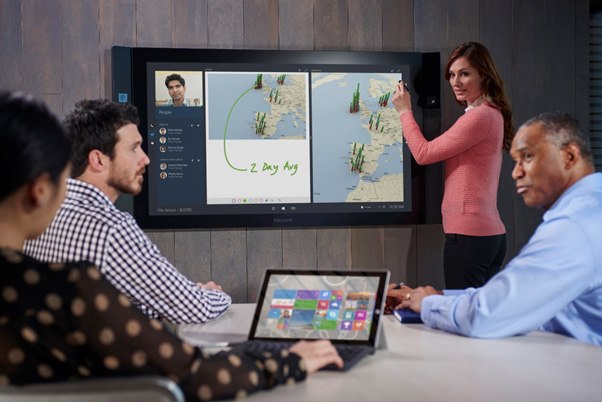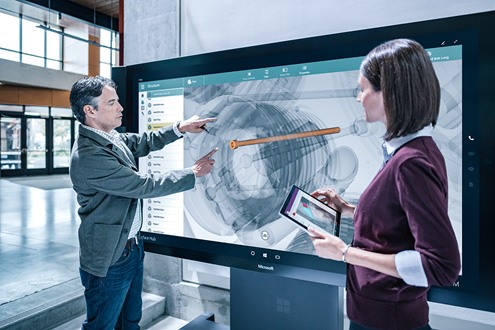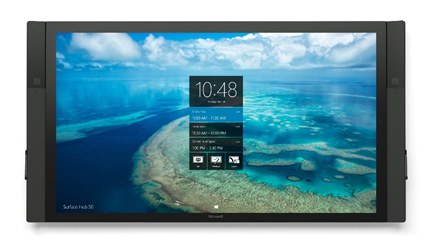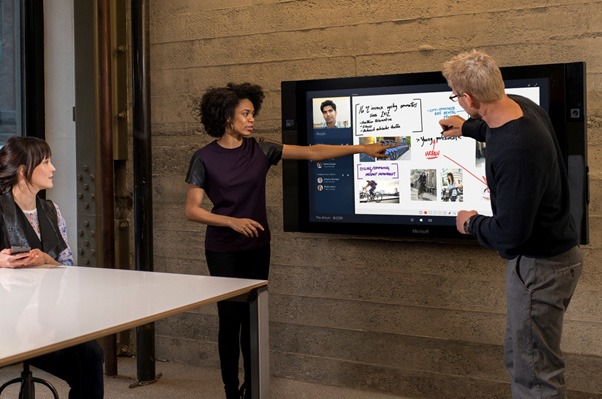At the Hub of the Business?
You are here: >At the Hub of the Business?
The full value of the Microsoft Surface Hub will only be realised if it’s part of a digital transformation says Rufus Lunn of EBECS

Anyone using Microsoft products (and let’s face it, that includes most of us) will probably agree it was only a matter of time before the tech giant looked at the whole issue of meetings and developed the Surface Hub.
But will this ‘multi-touch collaboration device’, as Microsoft categorises it, become the default meeting tool, much like what Office 365 has become to email. Or will it become a prestige ‘nice-to-have’ seen only in the upper echelons of multinationals?
In many ways the Microsoft Surface Hub is a product whose time is now. A large touch-enabled computer, it provides meeting room access to all the Office apps we know and love; Word, Excel, PowerPoint together with the OneNote whiteboard and, naturally, Skype for Business. The ‘killer’ app is the Surface Hub Whiteboard, an infinite canvas on which writing and drawing is as natural and fluid as pen on paper.
Think of the latest business catch-words, the core concepts that organisations are currently striving to achieve. Among the most used must be ‘collaboration’, ‘better engagement’ and ‘digital transformation’. After all, collaboration is viewed as the route to innovation, something which is seen, as markets have become more fickle and fast-moving, as the key to sustainable success.
Yet the concept of collaboration hits a barrier in the modern work environment where the workforce is fragmented. Today most corporates work across multi-locations, usually dispersed across a wide global reach.
To counteract this, meeting rooms are often packed with screens, whiteboards, speakerphones, cameras, a large conference table, a conference room PC and other equipment to enable the different offices to talk with one another. Yet often there’s a lack of integration between the components and attendees are forced to ask IT to come and help.

One of the main bugbears about meetings is that they rarely begin on time. This is often because people are late. As if this weren’t annoying enough, it can also be because the technology needs setting up or isn’t working. When all is running smoothly, talking to one another and even exchanging documents is possible, but can the meeting participants actually work together – sharing and bouncing around ideas visually, as well as verbally?
Sadly, the type of energised, highly-engaged worker who is ready to generate these ideas is the exception to the rule. The Steelcase Global Reportsurveyed around 12,000 workers globally and found that one-third were actively disengaged from their work, with another third not helping to drive their company forward.
At certain levels of the business, time-wasting meetings could play a part in this disengagement. Studies abound about the value of meetings – all with a similar conclusion that they last too long and, in general, tend to be unproductive. And yet, there’s no evidence that the need for face-to-face rapport will decline. In fact, a German study on trends in the 2030 says that one of the most important shifts in the next two decades will be the growing need for human and social contact and the awareness of human needs.
So already we have a situation where the Surface Hub’s quick-start (you can join a Skye for Business meeting with a single tap!) and facility to share ideas effortlessly across locations can address the challenge. Also by using familiar Office apps means less time worrying about the technology and more time connecting with other people.
Let’s also consider the third business concept we mentioned; the goal of ‘digital transformation’. Most corporates are now a good way along this route. But often meetings are exempt from this progress, still burdened with cumbersome paper agendas and notes. When was the last time you took a photograph of a flipchart or whiteboard? Using the Surface Hub, meeting notes are digitised and can saved via OneNote or other applications. Post-meeting tasks now involve just a few clicks to send the OneNote notes to all participants or save them to SharePoint – not only a far quicker process, but also more secure.

The role the Surface Hub can play in the digital transformation of a business will vary from company to company – and this will impact on how a business will choose its supplier. As hardware, the hub can be bought from any authorised AV or IT equipment provider. However, for insight into how it can play a greater part in streamlining business it’s better to consider a Microsoft partner.
For example, as the UK Microsoft Dynamics partner of the year, eBECS will look at the bigger picture as to how the notes and ideas Surface Hub captures will fit into a company’s workflow and integrate into the systems you already have in place. If you’re already using Microsoft Software, it’s well worth working with eBECS to take a holistic approach to hardware and software within your organisation. In addition, their long-standing relationship with Microsoft and subsequent access to critical information will also help maximise the investment in a Surface Hub.

Which leads us to a perennial business concern – how long will it take for the Surface Hub to bring return on investment? The analyst firm Forrester has addressed this specific question analysing the experience of five customers and basing its calculations on a composite of these, deploying six devices by the end of the first year with a more significant scale out planned in years 2 and 3.
The three-year, risk-adjusted RoI was 138%, with printing costs down $25 per meeting and time saved estimated at 15 – 23 minutes per meeting. But one of the most rewarding benefits was the fact that sales meetings using the Surface Hub were considerably more successful than those without. Not only could the business provide more compelling, higher quality presentations, but they could also bring the client to the screen and together draw up a diagram or brainstorm a list, providing a greater level of meeting richness and interactivity. The results were a 20% uplift in sales.

Microsoft talks about the Surface Hub as ‘unlocking the power of the group’. It certainly reflects the zeitgeist in its emphasis on better collaboration, engagement and digital transformation. How far it can be embedded in a company’s workflow and realise its true value depends on the right advice and consultation at the outset.
Interested in learning more about how eBECS provides the best return on the Microsoft Surface Hub? Contact Rufus Lunn via mobile (07764 794 450) or via email (rlunn@ebecs.com) for more information.
- About Us
- Partners
- Careers
- Contact us
- eBECS and the Microsoft Core Data Platform
- Microsoft Dynamics NAV in Property Management
- Microsoft Dynamics Nav Manufacturing Solutions
- Microsoft Dynamics NAV Cloud pricing
- Drive your Azure Momentum with SQL Managed Instance
- Compare Microsoft Dynamics AX VS NAV
- Microsoft Azure Data Centre Migration Guide
- Microsoft Dynamics 365 Business Central or 365 for Finance & Operations?
- Introduction to Microsoft Dynamics 365 for Finance and Operations
- Microsoft Dynamics 365 Business Central or 365 for Finance & Operations? Thank You
- Microsoft Dynamics 365 Business Central or Dynamics 365 Finance
- Compare Microsoft ERP Solutions
- Compare Microsoft ERP Solutions, Dynamics NAV vs Dynamics 365 Business Central
- Microsoft Dynamics 365 Business Central Price
- Compare Microsoft ERP
Categories
- AI (3)
- Azure (2)
- Business Insights (1)
- Canvas Apps (1)
- Common Data Service (2)
- Crisis Communication (1)
- CRM (3)
- Customer Data Platform (1)
- Customer Insights (1)
- Data Analytics/BI (29)
- Data Management (1)
- Data Warehouse (1)
- Dynamics 365 (33)
- Dynamics 365 Finance (1)
- Dynamics 365 Sales Insights (1)
- Dynamics 365 Supply Chain Management (1)
- Dynamics AX (50)
- Dynamics CRM (22)
- Dynamics Field Service (10)
- Dynamics NAV (10)
- Dynamics Project Service Automation (PSA) (15)
- eBECS (4)
- eBECS Marketing (1)
- eBECS Policies (1)
- ERP (2)
- Internet of Things (IoT) (15)
- Master Planning AX (4)
- Microsoft 365 (1)
- Microsoft Lifecycle Services (4)
- Power Apps (4)
- Power Automate (3)
- Power BI (1)
- Power Platform (6)
- Power VIrtual Agent (1)
- PowerApps (2)
- Project Service Automation (2)
- Quality Management (1)
- Sales (1)
- Surface Hub (3)
- Top Tips (1)
News
Upcoming Events - Register Now
Join our list
eBECS will invite you to webinars, events and keep you up to date with relevant news. You can unsubscribe at any time.









